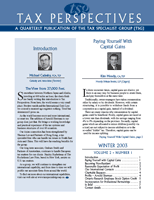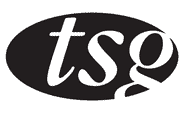
PDF Format
 Issue Contents Issue Contents
 All Issues All Issues
Winter 2003
Volume 2, Number 1
The information in Tax Perspectives is prepared for general interest only. Every effort has been made to ensure that the contents are accurate. However, professional advice should always be obtained before acting on the information herein.
In Brief
By Howard L. Wasserman, CA, CFP, TEP
Cadesky and Associates LLP (Toronto)
FIE/NRT Rules Released On October 11, 2002, the revised legislation for foreign investment entities ("FIE") and non-resident trusts ("NRT") was released, effective for taxation years beginning after 2002. Most of the rules are similar to those that were issued in the two previous draft releases. However, one significant change was in the FIE area. There is no longer the requirement to use a mark-to-market regime, except for very specific circumstances. The revised draft's default method is an income imputation regime. In other words, the prescribed rate of return is multiplied by the designated cost of the investments. For those entities that have become FIEs, a determination will have to be made as to the fair market value of assets on January 1, 2003. If the asset has gone up in value, then that fair market value is to be used. However, if the asset has gone down in value from its original cost, then it is the cost amount that must be used. The valuation of the assets and determination of the FIE income could be a significant burden on those Canadian residents who have a number of non-resident investments and/or joint ventures. The NRT rules contain the same harsh and unreasonable provisions of the previous drafts. However, there are still planning opportunities, especially, for new immigrants and non-residents. Third-Party Civil Penalties Recently, the CCRA updated their plan for administering the third-party civil penalty provisions. The CCRA has created a special committee to help ensure that the penalties are applied consistently in accordance with their Information Circular. They have stated that any field auditor who encounters a situation where these penalties may apply must consult a senior audit manager in their tax services office before considering a third-party penalty audit. The tax services office must then contact the penalty review committee's technical support group for authorization to start an audit. In other words, the auditor must get approval from this head office committee in order to just start. After the audit has been completed, the committee must then review the facts before endorsing or rejecting the auditor's recommendation. At this point, there have been only two cases of civil penalties being applied. However, it is likely that we will see more of these penalties as the CCRA auditors gain familiarity with the third-party civil penalty rules. The CCRA has stated that they will pay close attention to the civil penalty rule in those situations where a gross negligence penalty has been applied. Deductibility of Fines & Penalties Based on the Supreme Court decision of 65302 British Columbia, the CCRA has amended its Interpretation Bulletin on the deductibility of fines and penalties (IT-104R3). In the past, it was the CCRA's position that fines and penalties are not normally deductible. That has now changed. In its revised IT, it states the following: - The deduction of a fine or penalty cannot be disallowed solely on the basis that its allowance is contrary to public policy.
- To be deductible, a fine or penalty must be incurred for the purpose of gaining or producing income from a business or property.
- The fine or penalty does not have to be unavoidable in order to be deductible.
In establishing whether a fine or penalty was incurred for the purpose of gaining or producing income, the taxpayer must only establish that there was an income-earning purpose for the act or omission giving rise to the fine or penalty. As well, the taxpayer does not have to attempt to prevent the act or omission that resulted in the fine or penalty. Any fines or penalties incurred with the acquisition of assets should be included in the asset's capital cost. So save those parking tickets, they may be tax deductible. Valuing Charitable Gifts of Securities In a recent newsletter, the CCRA stated that in determining the value of securities that were donated, the donation date is the date on which the transfer of ownership occurs. This, they say, is a question of fact. The CCRA's position is that, generally speaking, the charity takes ownership of a share when it has the right to receive dividends declared or amounts on the corporation's liquidation, and the charity has the right to exercise the vote attached to the share. This can be of crucial importance when the value of the security has changed between the time that the donor has made a commitment to give these shares and the time that the actual transfer of ownership occurs. It is important to note, though,that when securities are left to a charity by Will, it is the CCRA's position that their value is determined immediately before the donor's death and not when the property is actually received by the charity. This again is a significant point as there have been many instances in the past two years where share prices have dropped significantly between the time of death and the actual gifting of the securities.
| 



